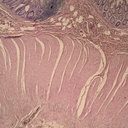GASTRIC CARCINOID TYPE 1 IN A PATIENT WITH AUTOIMMUNE POLYGLANDULAR SYNDROME: ADDITIONAL ENDOCRINOLOGICAL EVALUATION REQUIRED.
الكلمات الدالة
نبذة مختصرة
Autoimmune polyglandular syndrome by definition consists of two or more endocrinological insufficiencies or two organ specific autoimmune diseases. There are no stringent criteria for endocrinological evaluation of patients with one endocrine insufficiency. However, detailed endocrinological evaluation should be undertaken in patients with two autoimmune diseases. Additionally, follow up thereafter should be a must in these patients in order to avoid the possibility of not diagnosing subsequent autoimmune diseases that can occur. The aim of this case report is to point to the necessity of endocrinological screening to be made in patients presenting with gastric carcinoid type 1. We report on a 62-year-old woman who was diagnosed with primary hypothyroidism in 1993. In 2011, she was re-admitted to the hospital due to increasing fatigue. Macrocytic anemia, low vitamin B12 levels and positive parietal antibodies confirmed pernicious anemia. Furthermore, she underwent gastroscopy, which revealed two polyps in the corpus of the stomach and one in the fornix. Endoscopic mucosal resection was performed and histopathologic analysis confirmed three G1 gastric carcinoids (Ki67 2%). Additional endocrinological evaluation disclosed positive glutamic acid decarboxylase antibodies, but normal fasting and postprandial glucose and HbA1c. In 2013, she was diagnosed with glucose intolerance and subsequently with latent autoimmune diabetes of adulthood. Plasma glucose and HbA1c normalized after dietary intervention. Due to the increase of serum chromogranin A, prophylactic antrectomy was performed in 2014. The patient is still followed-up and has normal chromogranin A, gastrin and HbA1c levels.




